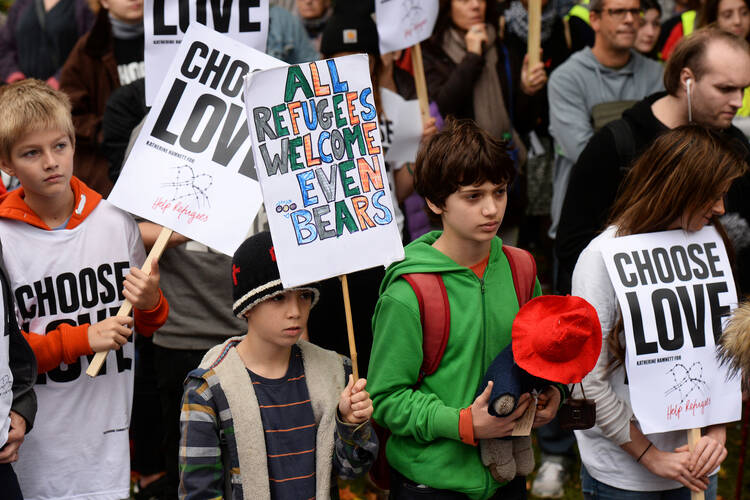A report from the London office of the Jesuit Refugee Service, just released, reveals an alarming incidence of street homelessness and destitution among refugees here in London. More shocking, J.R.S. contends that it is deliberate government policy to make life for refugees as difficult as possible.
The report finds that almost two-thirds of refugees have experienced street homelessness in the previous year, 20 percent of whom were sleeping on the capital’s cold streets for more than a month. At the same time, over a third of those who had some kind of housing described themselves as at risk of physical violence in their accommodation.
J.R.S. contends that it is deliberate government policy to make life for refugees as difficult as possible.
Sarah Teather, country director of J.R.S.-U.K., explained that the report, titled “Out in the cold: homelessness among destitute refugees in London,” foregrounded the realities of life for refugees in London that had first come to light in conversations over shared meals at the East London J.R.S. Day Centre.
Ms. Teather explained that anxiety about living arrangements was never far from these conversations, prompting her and her team to investigate more closely. What they found, she recounts, “is that destitute refugees are living in conditions which are worse even than we feared.”
Refugees experiencing destitution, including street homelessness, have not got into such predicaments as a result of poor provision—it is much worse than that. J.R.S. contends that it is deliberate government policy known as “the hostile environment agenda.”
Anyone applying for asylum may not take paid work nor receive state benefits.
In other words, this report names active government policy as directly and intentionally making people destitute. Not surprisingly, J.R.S. asserts that it “is not an acceptable tool of government policy” to deliberately make people destitute, particularly when it is known that such destitution exposes already vulnerable people “to street homelessness and significant risk of exploitation and abuse.”
What is this deliberate policy, and how is it made and enforced? The report highlights how arbitrary the system is for those seeking asylum. Anyone applying for asylum may not take paid work nor receive state benefits. When the system decides that a claimant’s process is exhausted, even the minuscule allowance of £36.95 ($52.44) per week ends, meaning, quite literally, destitution. Government policy creates this destitution.
Other pieces of legislation exacerbate these effects, making it very difficult for an asylum seeker to rent accommodation, even if they could afford it, while making it easier for private landlords to evict such a person. “The Home Office aims to create a ‘hostile environment’ for undocumented migrants,” the report notes. “This criminalises many every day activities, such as driving and work, and makes it extremely difficult for undocumented migrants to access vital services, notably healthcare.”
Almost half those surveyed reported having to move around, staying in different places on different nights.
There is semi-permanent street homelessness among refugees and asylum seekers. Almost half those surveyed reported having to move around, staying in different places on different nights. For those able to obtain roofed accommodation, there is a significant overcrowding problem. Most report volatile, threatening situations.
These are people who put their trust in this country to provide safety and security, often after unimaginable horrors. Sixty-year-old Svetlana, quoted in the report, says: “I am 15 years here. No support, no help. The government does not care.” She and her husband admitted to searching for food in garbage cans. The anti-immigrant rhetoric, often peddled and widely believed, that all asylum seekers are fit, opportunistic young men is far wide of the mark.
What can be done? Ending the automatic culture of suspicion toward refugees would go a long way. It needs also to be much more widely known, here in London as elsewhere, that there is an “exceptionally vulnerable group of people who are on the very margins of society and whose most basic needs are not met,” as the report stresses.
Their predicament did not come about by accident nor is there any civilized, let alone Christian, warrant for treating them as nuisances or, worse, scroungers. Charity can help, and the report recognizes that there is generosity. But the fullness of charity also includes a call to justice.
The report calls for a number of specific measures. The intentionally hostile environment has to be more widely known about and challenged. And those seeking asylum should be given the right to work. Not only would some of the most destitute people in our society benefit and their humanity be acknowledged but society itself would be a good deal less brutal. We might even come to see what Pope Francis has pointed out—that these stories are “signs of the times” on which we must reflect.











When I read that the British government is trying to create a hostile environment for refugees, my thoughts went to a book I am currently reading about the Irish ruled by Britain in the 17th century and the government issued penal laws against Catholics. No Catholic was permitted to own land, to vote, to hold public office, to work in civil service, to own a weapon, to own property over 5 pounds in value, to be educated, to practice as a lawyer, doctor, trader or professional. Ta;k about trying to create a hostile environment for refugees. The government seemed to use the same tactics against Irish Catholics. Different century, same kind of legal controls.
My daughter works with foreign students at a top university and they are also being treated badly under this “hostile environment “ policy, even though they are paying huge fees to study here.
I agree it is terrible to treat refugees so badly that they become destitute. It needs to be publicised so people are aware of what is happening.